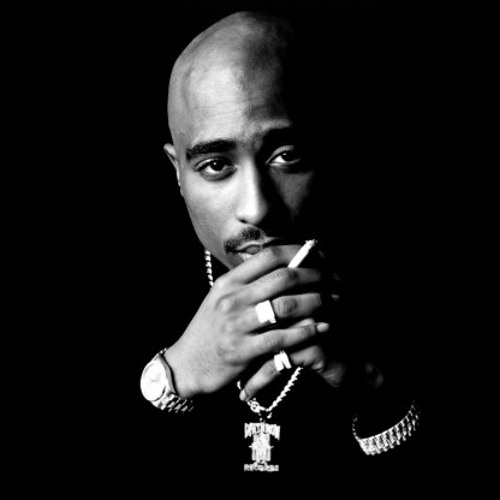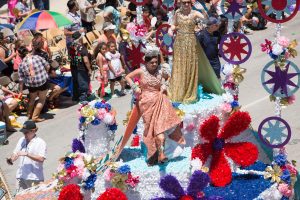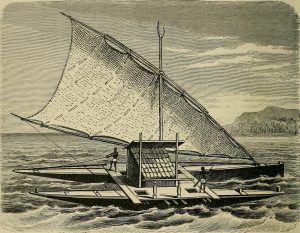Close your eyes and flashback to Harlem, New York in the 1970’s; you hear the unique dialect of thugs, pimps, and prostitutes alongside the upbeat rhythm of culture-rich music. You hear the tension of drug deals, the cries of hungry homeless children out in the cold, and the crackling of the fires of buildings being burnt down and soon to be abandoned. You hear police sirens fill the streets, and the cracking of police batons on the ribs of individuals who plead their innocence. But more importantly, you hear the silent screams of the oppressed on their last straw. Right smack in the middle of this revolutionary explosion, in 1971, was born Lesane Parish Crooks—the future Tupac Amaru Shakur.1

Tupac was born into a family that was deeply rooted in the Black Panther Party. The Black Panthers was a group of African Americans who wore iconic black outfits with black berets and emphasized “black pride.” They fiercely fought for human and civil rights, but more importantly, against police brutality. Although a social movement, they stood out from other movements of that time because, unlike other groups, they used violence to rebel. It was founded by Huey P. Newton and existed through the 1960’s-1970’s.2 His mother, Afeni Shakur, was guilty of 156 counts of crime due to her involvement with the Panther movement, and was in prison while pregnant with Tupac. Although lacking a high school degree, Afeni was incredibly smart. She was known for her public speaking, and when eight months pregnant, she acted as her own lawyer and won the case, getting her released from prison on account of a lack of evidence.3 From early in his life, Tupac lacked a father figure, and it is because of this that he was especially close to his mother and had much respect for her as a single, struggling parent. His godparents, two renowned Black Panther members, Assata Shakur and Elmer “Geronimo” Pratt, had important roles to play in the Panthers organization, so one could only imagine how developed Tupac’s sense of social awareness was from a very young age.
Growing up, Tupac automatically had a love for education. He always had the self-motivation to go to school and the instinct to pursue poetry and drama. Considering his lyrical reputation, it’s no surprise that Tupac was skillfully literate, and he soon began using this talent to say what he felt needed to be said. At fourteen years old, Shakur was enrolled in Baltimore’s School for the Arts, and it was here that he started rapping, his first real rap being about gun control.4 It didn’t take long at all for him to notice flaws in the education system and want to improve it. He later commented on how, after awhile, school became so repetitive that he stopped learning things that are actually important. For example, almost every year from Kindergarten to twelfth grade, children are required to take Math, English, and History courses of some sort, each one not being very different from the last. He felt kids lacked the opportunity to learn “important things,” such as how to complete their taxes, manage finances, and more; things, for example, that revolved around having street smarts and daily practicality. He had no hesitation taking on a leadership role, and took advantage of immediately getting involved. In high school, he started campaigns educating kids about safe sex, in a neighborhood where the rate of AIDS among teenagers was very high. He and some of his friends even wanted to restart the Black Panthers. But instead of the use of violence, his goal was to use his words to get his points across. Tupac particularly emphasized the importance of education, especially among the youth, and the importance of children being raised with the necessary mindset required for bettering the future, not only for themselves but for generations to follow. He also made it known that he absolutely hated racism, deplored the mistreatment of women, and saw both as result of ignorance.5 Tupac had never lived a luxurious life, but unfortunately, he and his family were faced with sudden financial difficulties. His mother had developed a cocaine addiction, due to her involvement with one of her ex-Panther friends. As her addiction worsened, she became unable to hold a job. This caused Tupac’s family to lose the privilege of being able to stay in one place for long. They had to keep moving, from Harlem to Baltimore, then to California, until they were eventually homeless. In 1988, at seventeen years old, Tupac was eventually forced to drop out of school and start selling drugs to pay the bills and support his family.6

Thankfully, a couple years later, in 1990, Tupac joined the HipHop group Digital Underground, and became a background dancer for them. He was also getting roles in movies, such as Ernest Dickerson’s film Juice.7 Tupac was juggling acting as well as rapping, with both really putting his name in the entertainment realm. His rap career really took off in 1991 when his first solo debut album, 2Pacalypse Now, was released.8 In this album, he raps about life in the streets for African Americans, especially in regards to police brutality, poverty, and the war on drugs. It was a real contrast to the stereotypes that rap just contained vulgarity and glamorized delinquent behavior. His frank tone and attitude immediately drew a lot of attention towards these hypersensitive topics, which were otherwise overlooked. Tupac Shakur was giving a new name to Gangsta Rap.9
2Pacalyse Now was arguably the most revolutionary compilation of Tupac’s career, because it sparked such a wide variety of emotions. In this album, not only did he identify problems of the ghetto, but he gave reasoning as to why they persisted, as well as even giving viable solutions, with his most emphasized solution being education. In his song, “Rebel of the Underground,” Shakur states,
“The most dangerous weapon: an educated black man.”10
Also in his 2Pacalypse Now album, in his song “Violent,” he talks about his blunt attitude, and his persistence to expose issues of the ghetto was being confused for violence. In this song, he states,
“They claim I’m violent just because I refuse to be silent…I will rebel against any oppressor and this is known as self defense…Unlock my brain, break the chains of your misery…My words are weapons and I’m steppin to the silent… Wakin up the masses, but you claim I’m violent.”11
Another profound piece on this album was his song “Words of Wisdom,” in which he directly speaks to those who are socially oppressed; more specifically, the African Americans of the lower class. He directly calls out problems regarding drugs, economic inequality among the classes, and how the education of kids in the ghetto is neglected. In this song, he states,
“It’s wrong to keep someone from learning something. I’m fed up, we gotta start teaching children that they can be all that they wanna be. There’s much more to life than just poverty…Conquer the enemy armed with education. Armed with the knowledge of the place we’ve been, no one will ever oppress this race again.”12
By the age of twenty years old, Tupac Shakur was not only changing a whole genre of music as we knew it, but approaching nationwide issues as no one had approached them before. He was changing the way people thought, how they looked at themselves, their place in society, and the importance of things such as education. He was doing all this through his words. Tupac once stated, “I’m not saying I’m going to rule the world or I’m going to change the world, but I guarantee that I will spark the brain that will change the world.”13 Although he died just five years after the release of his first album, his legacy still lives on today in the minds of those who wish to better the lives of the indigent youth. What do you say? Do you have the spark to change the world?
- Michael Dyson, Holler if You Hear Me (New York: Basic Civitas Books, 2001.), 6. ↵
- Encyclopedia of Activism and Social Justice, 2007, s.v. “Black Panther Party,” by Gary L. Anderson and Kathryn G. Herr. ↵
- Encyclopedia of African American History, 2010, s.v. “Shakur, Tupac,” by Aaron D. Sachs. ↵
- Encyclopedia of African American History, 2010, s.v. “Shakur, Tupac,” by Aaron D. Sachs. ↵
- Historic Films Stock Footage Archive, “Tupac Shakur 1988 High School Interview,” YouTube Video, 36:01, June 12, 2017, https://www.youtube.com/watch?v=v_XT9-C5Qu8&t=82s. ↵
- Encyclopedia of African American History 1896 to the Present, 2009, s.v. “Shakur, Tupac,” by Akil Houston. ↵
- Encyclopedia of African American History 1896 to the Present, 2009, s.v. “Shakur, Tupac,” by Akil Houston. ↵
- St. James Encyclopedia of Popular Culture, 2013, s.v. “Shakur, Tupac (1971-1996),” by Pierre-Damien Mvuyekure. ↵
- Simon Glickman, Tupac Amaru Shakur (Detroit: Gale, 2003), 26-27. ↵
- Anton Larson, “2Pac-Rebel of the Underground (lyrics on screen), YouTube Video, 3:11, May 11, 2012, https://www.youtube.com/watch?v=HKF_FZUjts4. ↵
- artfulgooner, “Tupac Violent Lyric Video,” YouTube Video, 6:27, May 6, 2013, https://www.youtube.com/watch?v=EKW3ps02L_o ↵
- 2Pac4ever, “2Pac-Words of Wisdom with lyrics,” YouTube Video, 4:54, January 7, 2016, https://www.youtube.com/watch?v=EsOVlPKyUME ↵
- EducateInspireChangeTV, “I Will Spark The Brain That Will Change The World-Tupac,” YouTube Video, 1:42, September 15, 2014, https://www.youtube.com/watch?v=uijBebYpoto. ↵



96 comments
Justine Ruiz
I never knew how involved Tupac’s family were with the Black Panthers. This explains a lot about his song lyrics and his way of speech. He knew how to express everything happening so perfectly. The death of Tupac is one of the saddest days in history because not many artists were social activists like him
Diego Oviedo
Hearing Tupac’s music one could hear that he believed in the black power. It was interesting to read that he was not only involved with his community but how he was trying to help in other places. Tupac used his music to spread awareness and knowledge to the people about what was going on around the communities but also how we should see and perceive our lives. Tupac was and will always have a huge impact not only in the music industry but also the world.
Vanessa Barron Ortiz
In the mist of discovering the the upbringing of tupacs lifestyle I understood why he never stopped working towards his dream.He was an activist to political issues; through his music he was able to educate the ignorant small minded individuals as well as unite those who endured a similar background. His legacy and lyrics live on as well as the extensive impact he formed in music today.
Ana Cravioto Herrero
Great article. It is clear that Tupac was such a hard worker and incredibly smart. It is sad that many people are born with bad circumstances surrounding them, but I am glad that Tupac tries to make the best of it. He was very wise and definitely made in impact in many people’s lives. His lyrics were very raw, and many of the things he rapped about are still very relevant issues we face today. He will always be remembered.
Nicholas Robitille
Tupac was not just an awardwinning rapper, but also a major black power believer. I was surprised to see just how involved Tupac was with not just his community, but later many communities. Tupac was a revolutionary, spreading information through the outlet of rap and expressing outrage at the terrible conditions of the hood. We will never forget Tupac and the impact he had on both Gangsta culture and impoverished problem awareness. God bless Tupac.
Saira Locke
I loved the way this article was said! Tupac was one of the most impactful rappers in the history of all music. He just didn’t focus on basic rapping material, he talked about the worlds issues when he rapped. He left a big handprint on what music is today and it is so mad to see him go soon. RIP
Eliezer Leal
This was a great article, I on’t know much about TuPac, but i admire him for his work. TuPac was one of the very few who stood up to society, who spoke truth through his songs. Back then society was in a bad place, oppressing colored people was very prominent back then and society didn’t care, they saw it as normal. TuPac spoke truth in songs that many heard, and when people are told they are in the wrong about something “normal” they do, they get mad and hate whoever tells them this because people are challenging their mindset of normality.
Audrey Uribe
Tupac is legendary for his controversial music. He started a whole new influence on the world and given the circumstances he was insanely successful. He was not accepted by everyone but he continued to pursue his passion and share his music with others. He wanted to change the future and he definitely left his mark. May he rest in peace.
Sydney Hardeman
I like this article a lot because it focuses a lot on Tupac’s character. The way Tupac grew up is the way that so many black children grow up. Tupac recognized that he could influence and educate the youth in his community in a positive way so that they did not fall into the traps of the system. He also, obviously, used music in a way that got him through his struggle and because he was so talented, he developed a platform in which he could address so many of these issues that he went through, which so much of the black community can relate to.
Malik Heard
Tupac changed rap as a whole and was one of the most influential rappers that has ever lived. He struck chords with a lot of people at the time.This article points out the good parts of Tupac and not just the thug parts of him it highlights the best parts of him and it gives people that have only heard of Tupac some more information on him so they can give there own opinion on his career and really listen to his music.